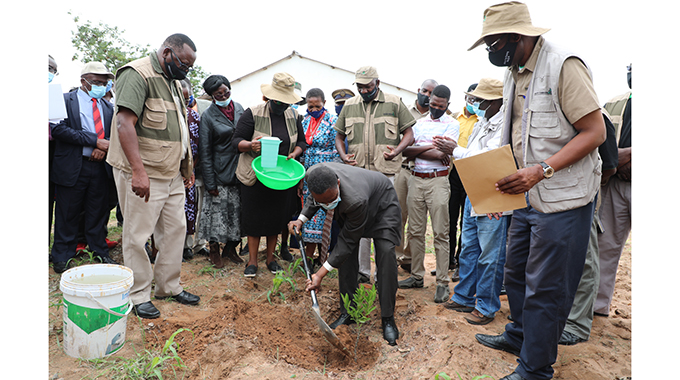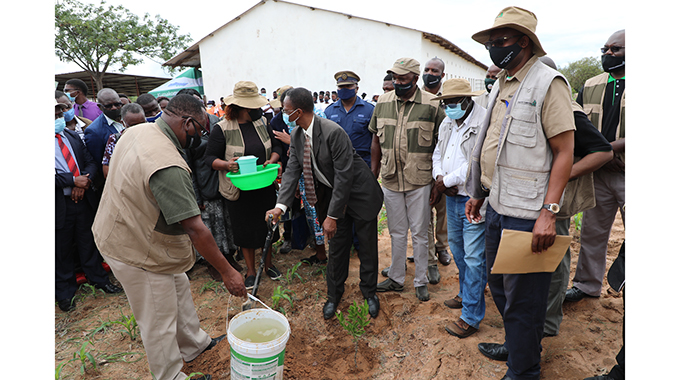Take fruit production seriously: First Lady

Rumbidzayi Zinyuke Manicaland Bureau
Communities in Manicaland should take fruit production seriously as it can offer sustainable streams of income for families that can improve the economy of the province as well as provide good tree cover to protect the environment, First Lady Amai Auxillia Mnangagwa has said.
The First Lady, who was represented by Provincial Development Coordinator Mr Edgars Seenza, said this at Chinyauhera Secondary School in Zimunya, where she planted fruit trees in commemoration of the National Tree Planting Day.

1 Manicaland Provincial Development Coordinator, Mr Edgars Seenza flanked by government officials planting a notches tree standing in for the First Lady of Zimbabwe Amai Auxillia Mnangagwa during the National tree planting day held at Munyarari Mission in Mutare District yesterday under the theme fruit tree for food security and nutrition. Picture by Tinai Nyadzayo.
This year’s commemorations are running under the theme “Fruit trees for food security and nutrition”. The African baobab is the Tree of the year.
“Fruit trees can generate income as you can sell the fruits or value-add to produce different beverages. I am confident that many of you have seen the baobab fruit being sold in Nyanyadzi and surrounding areas in Chimanimani,” she said. “As the Government is forging ahead with the Devolution agenda, I urge you to embark on fruit tree production and even the baobab so that they can help our children in future.” Amai Mnangagwa urged companies in the food processing and manufacturing industry to partner with communities to protect the resources found in those areas.

“Climate change has resulted in food insecurity so it is important for us to protect our forests by utilising them properly so that they can benefit us. This can only happen if we protect the forests we already have,” she added.
She urged villagers not to cut down trees to sell firewood, but for sustainable home use while those in tobacco production should plant more trees for curing their crop.
The First Lady also encouraged traditional, political and religious leaders to lead by example in the tree-planting initiative. Ten million trees are expected to be planted in Manicaland this year, the majority of which will be fruit trees. Forestry Commission general manager Mr Abednigo Marufu said tree-planting was important as it improves tree cover.
“We want each homestead to have trees, especially fruit trees so that we can improve forest cover,” he said. “Manicaland is the province with the most forests but we have been facing challenges with people cutting trees to make charcoal. This is against the country’s development agenda. This year Manicaland should plant 10 million trees so each household should plant trees for every occasion.”
Villagers said it was important to teach the young generation the importance of planting trees and protecting the environment.
“We have watched the trees get depleted over the years now our mountains are bare,” said Gogo Vena Chiadzwa (87). They are just cutting down trees and these young ones don’t listen anymore. We try telling them not to continue with this rampant tree-cutting but they don’t stop.
“It is painful that they are taking the firewood to sell in urban areas and the money is wasted on useless things.”
Mrs Farai Mudzokora said fruit trees were a good source of income as well as nutrition, especially during droughts.
Zimunya Headman Mr Happymore Nyamana said the cutting down of trees has been a serious challenge, which was affecting the community.
“We do not have electricity here so people have been using firewood as a source of energy,” he said. “The First Lady’s initiative is a very good project because she has brought something that will help solve this problem. We are hopeful that all communities, churches and other stakeholders will take up this initiative. We should not wait for such programmes only but planting trees should be an everyday thing. If you cut one tree then plant six more so that our environment can continue to sustain us.”











Comments